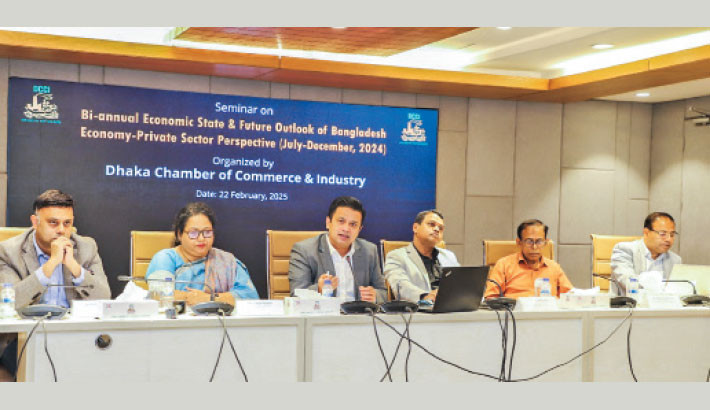Staff Correspondent
Published:2025-02-23 10:53:45 BdST
DCCI urges govt to boost private sector credit flow, investment
Dhaka Chamber of Commerce & Industry (DCCI) has urged the interim government to take effective measures to increase private sector credit flow, enhance revenue generation, curb inflation, and foster a business-friendly environment in the country.
Speaking at a seminar titled “Bi-Annual Economic State and Future Outlook of Bangladesh Economy – Private Sector Perspective (July-December, 2024)” at the DCCI Auditorium, DCCI President Taskeen Ahmed emphasised the need for policy support to expand local and foreign investment, infrastructure development, and market regulation to control inflation.
Ahmed outlined several key measures to revitalise the economy, including Increasing private sector credit flow to double digits, strengthening governance and transparency in the financial sector, reducing interest rates on loans, expanding infrastructure development and integrated market management, lowering VAT on essential goods while increasing it on luxury products, formulating a long-term energy pricing policy to support industries, and enhancing alternative financing and digital financial systems for SMEs.
He also highlighted the potential of African and Latin American markets for Bangladeshi exports and called for uninterrupted power supply, security, and low-cost financing for industries.
Md Abdur Rahim Khan, additional secretary (Export) and acting secretary of the Ministry of Commerce, noted that the country’s revenue generation—US$40 billion in a $500 billion economy—was insufficient.
He emphasised the need for full automation of government services and the implementation of the National Single Window for trade facilitation.
He also stressed the importance of developing the light engineering sector, which he described as a potential game-changer for Bangladesh’s economy.
Dr M Masrur Reaz, chairman of Policy Exchange of Bangladesh, attributed inflation to the central bank’s delayed response in 2022, compounded by import restrictions and reserve shortages.
He projected an improvement once foreign reserves reach $25-27 billion, enhancing industrial imports and stabilising the supply chain.
Dr Mohammad Abu Eusuf, professor at the University of Dhaka, cautioned against a large budget deficit, as excessive government borrowing from banks could negatively impact private sector credit flow.
He underscored the need for better coordination between fiscal and monetary policies to control inflation and enhance revenue collection through automation.
Dr Mohammad Yunus, research director at BIDS, called for stronger compliance in industries and better public-private coordination to meet post-LDC graduation challenges.
He emphasised the need to expand the tax and VAT base and attract foreign direct investment, particularly in the leather and pharmaceutical sectors.
Dr Sayera Younus, executive director (Research) at Bangladesh Bank, acknowledged that inflation was driven by supply-side factors and a high exchange rate.
However, she expressed optimism that inflation would fall below 7% by 2026 and that private sector credit flow would reach double digits next year.
Additional Secretary of ERD, Ministry of Finance, AHM Jahangir, stated that Bangladesh is fully prepared for LDC graduation.
He announced that a government committee, led by the ERD secretary, is consulting stakeholders to devise a comprehensive transition strategy.
The seminar concluded with insights from DCCI Vice President Md Salem Sulaiman and board members, reinforcing the need for collaborative efforts between the government and private sector to ensure economic stability and growth.
Unauthorized use or reproduction of The Finance Today content for commercial purposes is strictly prohibited.


